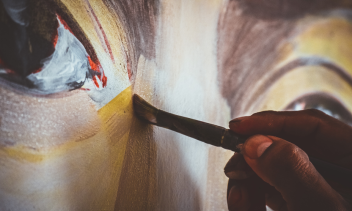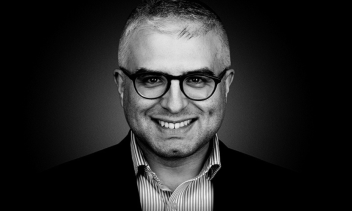What would your life be like if you had more practice at the hard parts? This is the question posed by comedian-director Nathan Fielder’s latest project, the HBO series The Rehearsal. In the series, the first season of which is out now, Fielder sets himself in an escalating set of rehearsals, attempts at elaborate recreations of challenging decisions, moments, or conversations from people’s lives.
For one participant in the show, that means revealing a lie that he made many years ago; Fielder builds a fake bar, hires a large cast of actors, and develops complex decision charts to help the man practice every possible iteration of the conversation he wants to have. For another participant, this means the decision to raise a child. For this, Fielder brings in a cast of children, rents a large house in rural Oregon, and plays out the drama of raising a child.
I won’t give too much away about this bizarre show, but I’ll say that it raises fascinating questions about the stuff of life itself. While entertaining throughout, it’s also consistently uncomfortable to watch. Like Fielder’s earlier cringe comedy show Nathan For You, one’s not quite sure about whether he’s in on the joke or if there is even a joke to be in on, and one is almost definitely sure that the participants on The Rehearsal aren’t aware of what is being built around them. Is the point to cringe, laugh, think, or cry? We sure don’t know, and you’ll have to watch it for yourselves to find out. Until then, we offer three reflections on the hard work of growth that we learned from this show.
1. Don’t Make Other People Actors In Your Drama
The New Yorker film critic Richard Brody titled his review of Fielder’s show “The Cruel and Arrogant Gaze of Nathan Fielder’s ‘The Rehearsal’,” Brody focuses on what he calls “the Look.” In his words:
That capital-letter stare is the visual center of Fielder’s new series, “The Rehearsal,” on HBO Max. It’s the stare in which parents hold children, teachers hold students, judges hold the accused. It’s the look of mastery itself—the optical grip that makes subjects squirm.
You may be familiar with the Look as one you get from the person in front of you in Shul, when your children make too much noise, or when you wear the wrong thing in your Bais Yaakov. The Look is one in which the Looked at is object to the Looker. We might think of the Look as being thematically (or cinematically?) related to Janet Malcolm’s famous and equally morally ambigous nonfiction work, The Journalist and the Murderer, and perhaps in a different way to Jordan Peele’s recent Nope. In contrast to the human-affirming look of Buber’s I-Thou relationship, this is a look with an imbalance of power, an objectifying look. It’s a look that, together with the cinematic viewpoint, puts the unsuspecting on the defense, frames them as other.
When attempting to become better, there are many ways we navigate and negotiate our relationship with those around us. In my days in yeshiva, Elul was full of such questions. Should Reuvein ask for forgiveness from Shimon, if Shimon was unaware that a wrong was done unto them? How uncomfortable should the process of teshuva get? In our attempts at teshuva, are we treating others as unwilling actors in our own road of healing? Or are we learning to approach them with more dignity, seeing them as more than we saw them before?
It’s no surprise that so much of the Jewish myths around angels have to do with eyes. Just think of the Talmudic comment in Avodah Zarah 20b that the angel of death is full of eyes, a remark paralleled by the Zohar referring to tsaddikim as being מליין עיניין, full of eyes. Or go to Yechezkel (1:18), for the angel full of eyes. My personal favorite is from a Christian monk, Abbot Bessarion of the desert fathers, who said, “The monk should be all eye, like the cherubim and seraphim.”
Perhaps this family of images reflects a similar set of anxieties around being seen by heaven, our desire to be seen and our fear of being seen by heaven. There’s probably more to be said about this thought, about how we do or don’t want to be seen by heaven, about why some of us are fond of the metaphors of ‘video cameras in the sky,’ but that’s enough for now. The basic point is this: If Fielder’s Look turns the other into an actor in his drama, let’s look at others in more affirming, compassionate ways, and let our eyes be healed by such looking.
2. Teshuva Is Messy
The pattern of The Rehearsal is deceptively simple: Again and again, Fielder attempts the impossible, distilling a conversation or decision of great weight to a rehearsable calculus. Figure out everything that can happen, practice every eventuality, and doing the hard thing becomes easy. Right? Each time, with comically intensifying befuddlement by Fielder, something goes awry, suggesting to the viewers that life is hard even when it’s all been figured out.
The instinct makes sense, and is also part of the story of teshuva. Making meaningful change, doing the hard work that we all know to be necessary, is both frightening and confusing. Faced with the entirety of the work we have to do, there’s a part of us that craves a system, a map. The rich Jewish literature around moral development and teshuva track with this, from the Rambam’s Hilchot Teshuva to Rabbeinu Yonah’s Sha’arei Teshuva, there are countless systems that make teshuva make sense to us.
I’ve always gone back and forth on these systems. Although of course my opinion is basically meaningless next to these giants, in my own work towards teshuva, some works have felt organic, guiding me towards meaningful change, and others always felt more abstract, theoretical, like there was something too clean about the teshuva they outlined. I might just be rehashing bad memories though; One Erev Yom Kippur in yeshiva, an overeager Kollel member recruited me to listen to his recitation of the entire Shaarei Teshuva after Shacharis. It was not short, nor was it particularly fun.
These aren’t distant questions for me. As a doctoral student in clinical psychology, I spend most of my working life thinking, learning, and working around theories of therapeutic change. Teshuva, therapeutic change, and meaningful growth are messy things. Our best attempts to sanitize the work of teshuva go awry, we find ourselves in deeper than we thought we’d be, and the fleshy humanness of the real world surprises us. But that’s also where the fun is. There’s nothing more real than wanting teshuva to be clean, easy, and rehearsable, and yet so often this easy teshuva evades us. If your growth has been like mine, it’s been far messier, and I choose to think this too is teshuva.
3. And Yet… Practice Works
One tricky part of this show is the surprising effectiveness of the whole system. Through sly camera cuts and elaborate scheming, time and again the viewer is surprised by how effective Fielder’s machinations are. Conversations go as planned on paper, the expected sometimes does occur, and people do figure things out through endless rehearsal! What do we make of this?
Maybe this cuts against everything else I said, but that’s OK: Repetition works. As performative and shallow as it is in The Rehearsal, sometimes that’s enough. Behavioral change can occur when we learn new habits, and the Hebrew phrase לחזור בתשובה might be translatable as ‘to return,’ or perhaps to repeat in teshuva.
At the risk of throwing one too many movies at you, Groundhog Day can’t go unmentioned. In this winter classic, an unhappy newsman becomes trapped in the same day endlessly, until somehow he gives in to the cyclicality of it all and becomes a better person, and is only then able to move on with life. (Given the Buddhist idea of Samsara and/or the myth of eternal recurrence, Groundhog Day is also our official favorite Buddhist movie, if it matters).
R. Menachem Froman, that endlessly entertaining Israeli tsaddik and activist, taught the following truth, in his Chassidim Tzochakim Mizeh (104):
“The term for “finishing” (la’avor) a tractate of Talmud derives from the language of “transgression” (averah). I know people who have finished the entirety of Talmud … Repeating (lachzor) Talmud derives from the language of “repentance” (lachzor bateshuva).
The philosopher Agnes Callard rings similarly, in her suggestion of the two faces of aspiration, the “near face,” that represents our hope that is “as lesser than it is,” and a “distant face,” which “ennobles her current activity beyond its rightful status.” Put in more mundane words, with a friend or lover, we might want to smile more in the immediate, as part of a deeply hidden aspiration to be the person we always dreamed of becoming. Practice, repetition, and rehearsal might just be the bridges between these two faces.
The Rambam’s advice that a teshuva is complete when one returns to the scene of the crime and does differently comes to mind in its suggestion that even after a complete teshuva, one is in the very same place, in the same context. This is also a truth I hope to be true in life—that somehow, anyhow, through the endless repetitions of our days, months, years, and fumbling attempts at change, we might yet grow, become more, and be better. Through the endless dress rehearsals of our teshuva, our thousand attempts at finally doing better, perhaps we might fail our way to a better tomorrow. I hope you find these reflections illuminating. And if you don’t, that’s OK: Practice might just make perfect.
Thoughts, questions, comments, or concerns? Reach out at info@18forty.org, and let us know what’s on your mind. We’d love to hear from you!








